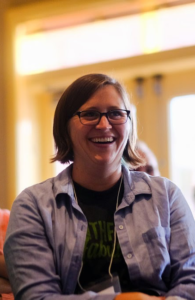by Amanda Gerken-Nelson
“PALM”
 That’s the term many of us in the queer community serving the church have called our partners, lovers, spouses, or significant others for the past ten years. Somewhat jokingly, yet somewhat seriously, this term embodied both our deepest love and our oppression.
That’s the term many of us in the queer community serving the church have called our partners, lovers, spouses, or significant others for the past ten years. Somewhat jokingly, yet somewhat seriously, this term embodied both our deepest love and our oppression.
It stands for “Publicly Accountable Life-Long Monogamous” and it’s the language used in the 2010 revised version of the ELCA policy Vision and Expectations – in place of partner, lover, spouse, or significant other for those who are in same-gender relationships.
While seemingly descriptive, the term is explicitly conscriptive.
When the path to ordination for LGBTQIA+ individuals was opened in 2009, the invitation to serve was like that of so many churches and institutions: “you are welcome here as long as you look like us, act like us, and do not disturb our ways of being in this world.”
When I was serving as the pastor of Faith Lutheran Church in East Hartford, CT, I had the opportunity on a few occasions to receive new members. Recalling the wisdom of my Old Testament Professor, the Rev. Dr. Steed Davidson, who once told me “even when we welcome others into community, there is power: ‘I have the power to welcome YOU into OUR community,” I would always augment the rite of reception ever so slightly to say: “we look forward to how you will change us and help us grow evermore fully into the beautiful kin-dom of God.”
In 2019, I, on behalf of ELM, was able to bring both of these perspectives into the process to review and revise Vision and Expectations.
I was able to lift up and share the voices, perspectives, and experiences of queer people and how this document has inhibited and excluded our gifts; and, I was able to share how our gifts have the potential to change the ELCA and help us to live ever more fully into the beautiful kin-dom of God.
I have heard our church leaders say that Vision and Expectations is more than just about human sexuality, and yet it has been the crux of its application. Minimizing V&E’s focus on human sexuality minimizes and erases the oppression queer people have experienced in the world and in the church which hyper focuses on who we have sex with and/or with whom we have deep, meaningful relationships.
Certainly, there is more to V&E and the church than human sexuality, just as there is more to my relationship with my wife than our sexual intimacy.
Yet, perhaps, healing our relationship with human sexuality is exactly where we need to start this process of reconciliation so as to liberate us from the ways we have tried to confine and construct such relationships rather than celebrate the joy and awe of God’s beloved creation.
Human sexuality needs a Good Friday – a time to die to the systems of oppression that have defined with whom and how we are to be in relationship and who has power – so that we can experience the delight and release of its Easter morning.
Thank you to those who gave of their talents and treasurers in 2019 to make ELM’s advocacy and activism in this process possible. The journey continues and I look forward to seeking it out with you in 2020.

Amanda Gerken-Nelson (she/her/hers) serves as executive director of ELM and is a proud member of Proclaim and a rostered minister in the ELCA. Amanda would like to thank Dr. Davidson for ruining Christmas and for giving her faith the breadth and depth she needed to sustain her in ministry.

